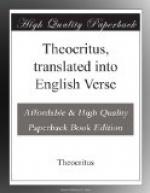But all my fair frame stiffened into wax.
Bethink thee, mistress Moon, whence came my love.
He bent his pitiless eyes on me; looked down,
And sate him on my couch, and sitting, said:
“Thou hast gained on me, Simaetha, (e’en as I
Gained once on young Philinus in the race,)
Bidding me hither ere I came unasked.
Bethink thee, mistress Moon, whence came my love.
“For I had come, by Eros I had come,
This night, with comrades twain or may-be more,
The fruitage of the Wine-god in my robe,
And, wound about my brow with ribands red,
The silver leaves so dear to Heracles.
Bethink thee, mistress Moon, whence came my love.
“Had ye said ‘Enter,’ well: for ’mid my peers
High is my name for goodliness and speed:
I had kissed that sweet mouth once and gone my way.
But had the door been barred, and I thrust out,
With brand and axe would we have stormed ye then.
Bethink thee, mistress Moon, whence came my love.
“Now be my thanks recorded, first to Love,
Next to thee, maiden, who didst pluck me out,
A half-burned helpless creature, from the flames,
And badst me hither. It is Love that lights
A fire more fierce than his of Lipara;
(Bethink thee, mistress Moon, whence came my love.)
“Scares, mischief-mad, the maiden from her bower,
The bride from her warm couch.” He spake: and I,
A willing listener, sat, my hand in his,
Among the cushions, and his cheek touched mine,
Each hotter than its wont, and we discoursed
In soft low language. Need I prate to thee,
Sweet Moon, of all we said and all we did?
Till yesterday he found no fault with me,
Nor I with him. But lo, to-day there came
Philista’s mother—hers who flutes to me—
With her Melampo’s; just when up the sky
Gallop the mares that chariot rose-limbed Dawn:
And divers tales she brought me, with the rest
How Delphis loved, she knew not rightly whom:
But this she knew; that of the rich wine, aye
He poured ‘to Love;’ and at the last had fled,
To line, she deemed, the fair one’s hall with flowers.
Such was my visitor’s tale, and it was true:
For thrice, nay four times, daily he would stroll
Hither, leave here full oft his Dorian flask:
Now—’tis a fortnight since I saw his face.
Doth he then treasure something sweet elsewhere?
Am I forgot? I’ll charm him now with charms.
But let him try me more, and by the Fates
He’ll soon be knocking at the gates of hell.
Spells of such power are in this chest of mine,
Learned, lady, from mine host in Palestine.
Bethink thee, mistress Moon, whence came my love.
He bent his pitiless eyes on me; looked down,
And sate him on my couch, and sitting, said:
“Thou hast gained on me, Simaetha, (e’en as I
Gained once on young Philinus in the race,)
Bidding me hither ere I came unasked.
Bethink thee, mistress Moon, whence came my love.
“For I had come, by Eros I had come,
This night, with comrades twain or may-be more,
The fruitage of the Wine-god in my robe,
And, wound about my brow with ribands red,
The silver leaves so dear to Heracles.
Bethink thee, mistress Moon, whence came my love.
“Had ye said ‘Enter,’ well: for ’mid my peers
High is my name for goodliness and speed:
I had kissed that sweet mouth once and gone my way.
But had the door been barred, and I thrust out,
With brand and axe would we have stormed ye then.
Bethink thee, mistress Moon, whence came my love.
“Now be my thanks recorded, first to Love,
Next to thee, maiden, who didst pluck me out,
A half-burned helpless creature, from the flames,
And badst me hither. It is Love that lights
A fire more fierce than his of Lipara;
(Bethink thee, mistress Moon, whence came my love.)
“Scares, mischief-mad, the maiden from her bower,
The bride from her warm couch.” He spake: and I,
A willing listener, sat, my hand in his,
Among the cushions, and his cheek touched mine,
Each hotter than its wont, and we discoursed
In soft low language. Need I prate to thee,
Sweet Moon, of all we said and all we did?
Till yesterday he found no fault with me,
Nor I with him. But lo, to-day there came
Philista’s mother—hers who flutes to me—
With her Melampo’s; just when up the sky
Gallop the mares that chariot rose-limbed Dawn:
And divers tales she brought me, with the rest
How Delphis loved, she knew not rightly whom:
But this she knew; that of the rich wine, aye
He poured ‘to Love;’ and at the last had fled,
To line, she deemed, the fair one’s hall with flowers.
Such was my visitor’s tale, and it was true:
For thrice, nay four times, daily he would stroll
Hither, leave here full oft his Dorian flask:
Now—’tis a fortnight since I saw his face.
Doth he then treasure something sweet elsewhere?
Am I forgot? I’ll charm him now with charms.
But let him try me more, and by the Fates
He’ll soon be knocking at the gates of hell.
Spells of such power are in this chest of mine,
Learned, lady, from mine host in Palestine.
Lady, farewell:
turn ocean-ward thy steeds:
As I have purposed, so shall
I fulfil.
Farewell, thou bright-faced
Moon! Ye stars, farewell,
That wait upon the car of
noiseless Night.
IDYLL III.
The Serenade.




